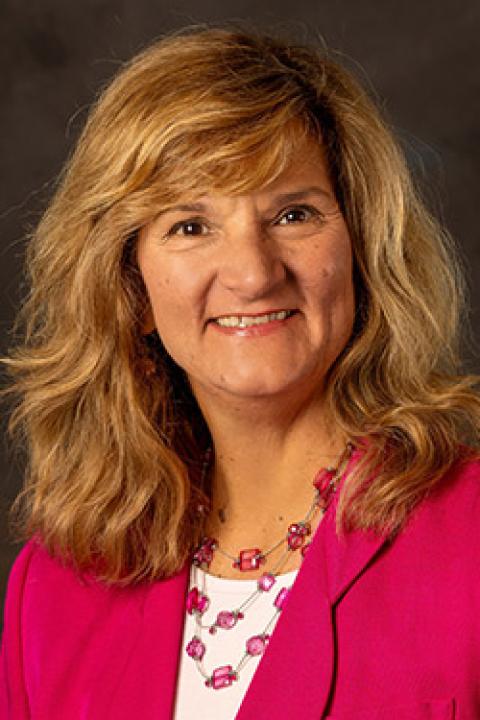
Patricia Halpin
Courses Taught
- BIOL 413: Principles of Biology I Lab
- BIOL 414: Principles of Biology II Lab
- BIOT 501: Ethical Issues in Biology
- BMS 702: Endocrinology
- BSCI 401: The Lives of Whales
- BSCI 670: Clinical Pathophysiology
- BSCI 695: Exploring Biology Teaching
- BSCI 793: Internship
- ZOOL 625: Principles Animal Physiology
- ZOOL 626W: Animal Physiology Laboratory
Education
- Ph.D., University of Connecticut
- M.S., University of Connecticut
- B.S., Old Dominion University
Research Interests
- Community/Outreach Programs
- E-Learning
- Pedagogy
- Social Media
Selected Publications
Gopalan, C., Halpin, P. A., Selvam, A. A. A., & Hung, W. -C. (2024). Exploring educational transformations through the Innovative Flipped Learning Instruction Project Symposium.. Adv Physiol Educ, 48(3), 505-511. doi:10.1152/advan.00027.2024
Hsu, J. L., & Halpin, P. A. (2022). Exploring physiology instructors' use of core concepts: pedagogical factors that influence choice of course topics.. Adv Physiol Educ, 46(4), 667-676. doi:10.1152/advan.00114.2022
Halpin, P. A. (2022). Digital Stories on Endocrine Diseases/Disorders in an Asynchronous Course Improves Content Knowledge and Oral Communication Skills. In ACTA PHYSIOLOGICA Vol. 236 (pp. 260). Retrieved from https://www.webofscience.com/
Halpin, P. A., Scholz-Morris, E., & Carvalho, H. A. (2022). Creating and Validating Dramatization via Zoom as Teaching Method for Diverse Student Populations. In ACTA PHYSIOLOGICA Vol. 236 (pp. 265). Retrieved from https://www.webofscience.com/
Halpin, P. A. (2022). Redesigning a face-to-face course to an asynchronous online format: a look at teaching pathophysiology with software that enhances student engagement.. Adv Physiol Educ, 46(2), 339-344. doi:10.1152/advan.00031.2022
Halpin, P. A., & Gopalan, C. (2021). Teaching Membrane Transport Concepts Using Flipped Teaching & Dramatizations. AMERICAN BIOLOGY TEACHER, 83(5), 337-340. doi:10.1525/abt.2021.83.5.337
Halpin, P. A., & Crowther, G. J. (2021). Tunes in the Zoom Room: Remote Learning via Videoconference Discussions of Physiology Songs
†. Journal of Microbiology & Biology Education, 22(1). doi:10.1128/jmbe.v22i1.2529Halpin, P. A., & Crowther, G. J. (2021). Tunes in the Zoom Room: Remote Learning via Videoconference Discussions of Physiology Songs. JOURNAL OF MICROBIOLOGY & BIOLOGY EDUCATION, 22(1). doi:10.1128/jmbe.v22i1.2529
Halpin, P. A., & Gopalan, C. (2021). Using dramatizations to teach cell signaling enhances learning and improves students' confidence in the concept. ADVANCES IN PHYSIOLOGY EDUCATION, 45(1), 89-94. doi:10.1152/advan.00177.2020
Halpin, P. A., Johnson, J., & Badoer, E. (2021). Students from a large Australian university use Twitter to identify difficult course concepts to review during face-to-face lectorial sessions. ADVANCES IN PHYSIOLOGY EDUCATION, 45(1), 10-17. doi:10.1152/advan.00147.2020
Halpin, P. (2020). Designing a New Course with a Spring Break Study Abroad Research Experience Benefits STEM Commuter Students. Bioscene, 42(2), 8-15.
Halpin, P. A., Donahue, A. E., & Johnson, K. M. S. (2020). Undergraduate biological sciences and biotechnology students' reflective essays focus on descriptive details of experiential learning experiences. ADVANCES IN PHYSIOLOGY EDUCATION, 44(1), 99-103. doi:10.1152/advan.00144.2019
Halpin, P. A., Fleury, C. H., & Page, C. (2019). Second graders and their teacher have PhUn learning about thermoregulation. ADVANCES IN PHYSIOLOGY EDUCATION, 43(2), 159-163. doi:10.1152/advan.00207.2018
Halpin, P. A., & Lockwood, M. K. K. (2019). The use of Twitter and Zoom videoconferencing in healthcare professions seminar course benefits students at a commuter college. ADVANCES IN PHYSIOLOGY EDUCATION, 43(2), 246-249. doi:10.1152/advan.00017.2019
Monteferrante, G. A., Cruz, M. M., Mogadouro, G., Fantini, V. D. O., Castro, P. O., Halpin, P. A., & Lellis-Santos, C. (2018). Cardiac rhythm dance protocol: a smartphone-assisted, hands-on activity to introduce concepts of cardiovascular physiology and scientific methodology. ADVANCES IN PHYSIOLOGY EDUCATION, 42(3), 516-520. doi:10.1152/advan.00028.2017
Halpin, P., Sparrow, J., & Cantagallo, H. (2018). Assessment of a 4th Grade PhUn Week Experiment on the Cardiovascular System.. Advances in Physiology Education, 42, 329-333. doi:10.1152/advan.00190.2017
Gamtso, C. W., & Halpin, P. A. (2018). Tailoring Library Instruction for Non-Science Majors Taking Hybrid and Online Science Classes: Student Perceptions of Information Literacy in the Virtual Environment. Public Services Quarterly, 14(2), 99-118. doi:10.1080/15228959.2017.1372729
Gopalan, C., Halpin, P. A., & Johnson, K. M. S. (2018). Benefits and logistics of nonpresenting undergraduate students attending a professional scientific meeting. ADVANCES IN PHYSIOLOGY EDUCATION, 42(1), 68-74. doi:10.1152/advan.00091.2017
Stieben, M., Halpin, P. A., & Matyas, M. L. (2017). Developing a nationwide K-12 outreach model: Physiology Understanding (PhUn) Week 10 years later. ADVANCES IN PHYSIOLOGY EDUCATION, 41(3), 357-362. doi:10.1152/advan.00005.2017
Blatch, S. A., Cliff, W., Beason-Abmayr, B., & Halpin, P. A. (2017). The Fictional Animal Project: a Tool for Helping Students Integrate Body Systems. ADVANCES IN PHYSIOLOGY EDUCATION, 41(2), 239-243. doi:10.1152/advan.00159.2016
Halpin, P. A. (2017). Performing international outreach: PhUn Week in an Australian primary school. ADVANCES IN PHYSIOLOGY EDUCATION, 41(1), 25-28. doi:10.1152/advan.00153.2016
Halpin, P. (2016). Research and Teaching: Using Twitter in a Nonscience Major Science Class Increases Journal of College Science Teaching. Journal of College Science Teaching, 045(06). doi:10.2505/4/jcst16_045_06_71
Halpin, P. A., & Landon, J. (2015). The art and practice of gratitude: practicing an overlooked skill to help undergraduate biology students become successful professionals. ADVANCES IN PHYSIOLOGY EDUCATION, 39(2), 125-127. doi:10.1152/advan.00023.2015